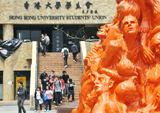A Hong Kong student union began voting yesterday on a motion condemning Beijing’s deadly crackdown on pro-democracy demonstrations 20 years ago that left hundreds dead in the Chinese capital.
In the poll, which ends today, the University of Hong Kong student union is deciding on a motion calling for Beijing to “rectify” its position that the 1989 Tiananmen Square protests were counter-revolutionary.
The motion, which comes weeks ahead of the June 4 anniversary of the violence, also argues that the Chinese government should be held responsible for the killings.

PHOTO: AFP
Hong Kong is the only Chinese city where protests against the crackdown are tolerated and is the location of an annual candlelight vigil attended by thousands of residents.
“This year marks the 20th anniversary of June 4 and we see it as a chance to establish the student union’s permanent stance on the issue. We want to put everything beyond doubt,” said Martin Kok (郝曉田), the union’s vice-president.
The motion says the government should “be held accountable for the June 4 massacre.”
“After 20 years of denial and injustice, the world has had enough,” it reads. “Thus, as the heirs to those who have fought and died for the freedoms which we now enjoy, we all share a duty to step forward on their behalf lest all of their sacrifices be in vain.”
Hundreds — if not thousands — of people were killed as soldiers from the People’s Liberation Army marched into central Beijing on June 4, 1989, to end the weeks-long demonstrations.
The subject remains taboo in China and human rights groups and activists have said the government is this year making huge efforts to ensure the few weeks ahead of the anniversary pass smoothly.
The Hong Kong students’ poll is being held after the union’s president, Ayo Chan (陳一諤), said last week that the military suppression could have been avoided had the students dispersed peacefully from Tiananmen Square, reports said.

Nauru has started selling passports to fund climate action, but is so far struggling to attract new citizens to the low-lying, largely barren island in the Pacific Ocean. Nauru, one of the world’s smallest nations, has a novel plan to fund its fight against climate change by selling so-called “Golden Passports.” Selling for US$105,000 each, Nauru plans to drum up more than US$5 million in the first year of the “climate resilience citizenship” program. Almost six months after the scheme opened in February, Nauru has so far approved just six applications — covering two families and four individuals. Despite the slow start —

YELLOW SHIRTS: Many protesters were associated with pro-royalist groups that had previously supported the ouster of Paetongtarn’s father, Thaksin, in 2006 Protesters rallied on Saturday in the Thai capital to demand the resignation of court-suspended Thai Prime Minister Paetongtarn Shinawatra and in support of the armed forces following a violent border dispute with Cambodia that killed more than three dozen people and displaced more than 260,000. Gathered at Bangkok’s Victory Monument despite soaring temperatures, many sang patriotic songs and listened to speeches denouncing Paetongtarn and her father, former Thai prime minister Thaksin Shinawatra, and voiced their backing of the country’s army, which has always retained substantial power in the Southeast Asian country. Police said there were about 2,000 protesters by mid-afternoon, although

MOGAMI-CLASS FRIGATES: The deal is a ‘big step toward elevating national security cooperation with Australia, which is our special strategic partner,’ a Japanese official said Australia is to upgrade its navy with 11 Mogami-class frigates built by Japan’s Mitsubishi Heavy Industries, Australian Minister for Defence Richard Marles said yesterday. Billed as Japan’s biggest defense export deal since World War II, Australia is to pay US$6 billion over the next 10 years to acquire the fleet of stealth frigates. Australia is in the midst of a major military restructure, bolstering its navy with long-range firepower in an effort to deter China. It is striving to expand its fleet of major warships from 11 to 26 over the next decade. “This is clearly the biggest defense-industry agreement that has ever

MILITARY’S MAN: Myint Swe was diagnosed with neurological disorders and peripheral neuropathy disease, and had authorized another to perform his duties Myint Swe, who became Myanmar’s acting president under controversial circumstances after the military seized power from the elected government of Aung San Suu Kyi more than four years ago, died yesterday, the military said. He was 74. He died at a military hospital in the capital, Naypyidaw, in the morning, Myanmar’s military information office said in a statement. Myint Swe’s death came more than a year after he stopped carrying out his presidential duties after he was publicly reported to be ailing. His funeral is to be held at the state level, but the date had not been disclosed, a separate statement from the